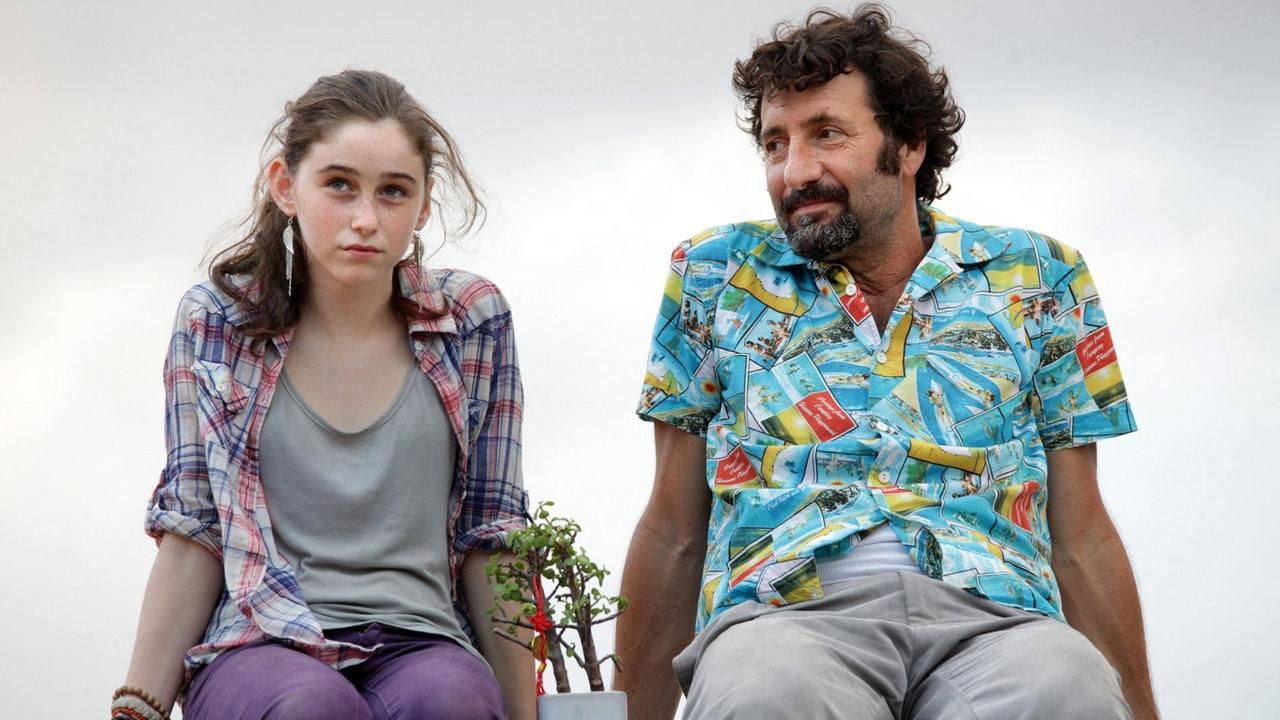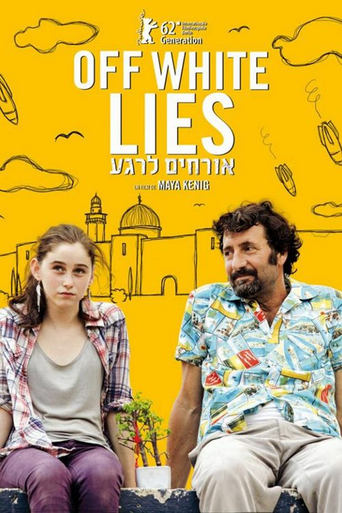

Saw this movie last night. Came away with a bit of a bad taste. Most importantly, the film perpetuates a number of damaging stereotypes about fathers: a trend that is even more pronounced in Israel than in the U.S. The protagonist is a never-employed man- child father who spends most of his time chasing impractical dreams. He has no concept of responsibility, either for his own life or that of his child. This is heightened by a number of scenes in which the child, a young teenager, is placed in a clearly parentified role where she demonstrates, at every turn, that she is both smarter and more sophisticated than her poor old dad. The cycle is completed when, in one scene, the wife of a seemingly high functioning character (who spends most of her time as a dilettante painter while benefiting from her husband's seemingly earned wealth) essentially describes all men as childish and prone to foolishness. So, now, all men, regardless of whether they take care of their life-responsibilities, show up for regular army reserve duty and act charitably towards others are lumped in the same group as the loafer-father. While these stereotypes may generate some easy laughs, their perpetuation as a societal norm in Israel constitutes one of the main reasons why Israel is one of the few democracies that continues to uphold nearly automatic custody rights for women, why fathers in Israel can be easily convicted and sent to jail without much proof of wrongdoing and why Israel has the second highest average child support obligation among all OECD countries (and which is based on flat numbers rather than income percentages). It is a shame that this film garnered as much critical acclaim as it seemingly does not deserve.
... View MoreI thought the strong and realistic performance of the two leads, Gur Bentwich and Elya Inbar, carried this Israeli film. This to me was a tough movie to rate because I could easily be extremely judgmental of the actions of some of the characters and how unlikable they could be at times. However, since the film interested me and kept my attention and my emotional involvement, I ended up giving it a favorable rating.Inbar's motion picture debut as Libi I found to be rather amazing. I really felt a lot of empathy for her trying to cope with extremely trying circumstances. She's a 13 year old asthmatic teen, who arrives in Israel, apparently have been "shipped off" by her mother, in California, for anger management issues.Libi will now be taken in and live with her father Shaul, also superbly portrayed by Gur Bentwith, even though for a number of years now they haven't been in close contact. What she doesn't know when she arrives, is that Shaul is broke, has no living quarters, or car. He's an inventor but has had no success in marketing or selling any of his ideas.In a borrowed car, he takes Libi to Northern Israel to visit and possible stay with his friend Avner. However, this is right at the time of the Israeli/Lebanese War and Hezbollah is sending missiles into cities in the North. They meet Avner in a neighborhood bomb shelter, but are soon heading back South. With money Avner gave Shaul, they temporarily take a hotel room.Here Shaul sees on TV that Israeli families in the South are opening up their home to Israeli refugees from the North, who have been displaced by the bombings. So Shaul, being the wheeler-dealer that he is sees an opportunity to get shelter from a host family, and has Libi go along with his concocted story.They eventually are taken in by a host family consisting of Gidi (Tzahi Grad), his wife Helit (Salit Achimiriam), and their 18 year old son. In a supporting role, I thought Grad's performance added quite a bit to the movie, as a high powered businessman who later became interested in one of Shaul's inventions.You can see Shaul and Libi love each other, but Libi is really stuck between a "rock and a hard place". My heart went out to her, as being a 13 year old she's kind of powerless in that situation. The remainder of the film involves not only Shaul and Libi's relationship, but also their eventual interpersonal relationships with their new host family.As mentioned earlier, there's plenty to dislike in some of the characters, especially Shaul who is consistently selfish and irresponsible. However, despite that for whatever reason I was absorbed in the story overall and wanted to see how it would turn out. I thought the eventual ending was rather simplistic and not really believable.
... View More...we should call it Reluctant Parents, the two examples that come to mind being Baby Boom starring Diane Keaton and Big Daddy starring Adam Sandler. Thus begins Orchim leRega: Homeless father Shaul takes custody of teenage daughter Libi...in the middle of Israel's 2006 Lebanon war.What can I say? Naively, perhaps, I really wanted Shaul's invention to catch on. Thus we would have had a clever movie whose plot takes a downer situation and unexpectedly turns it into a win-win.Instead, just when I was sure Shaul (and the audience) would have the last laugh all the way to the bank, the two end up just where they started: Shaul is jobless, broke, and still has nowhere to live. A shame. What began as a clever twist that exploits the wartime situation just...ends.Why in the world couldn't the screenwriter have made Libi, say, 15, not 13? That way, this miserable, lonely teen could have reaped her own happiness from the bizarre situation. And most baffling: She justifiably calls her dad a loser, yet after he humiliates her and gives up his big chance at making something of himself...she goes back to him. Why?
... View More